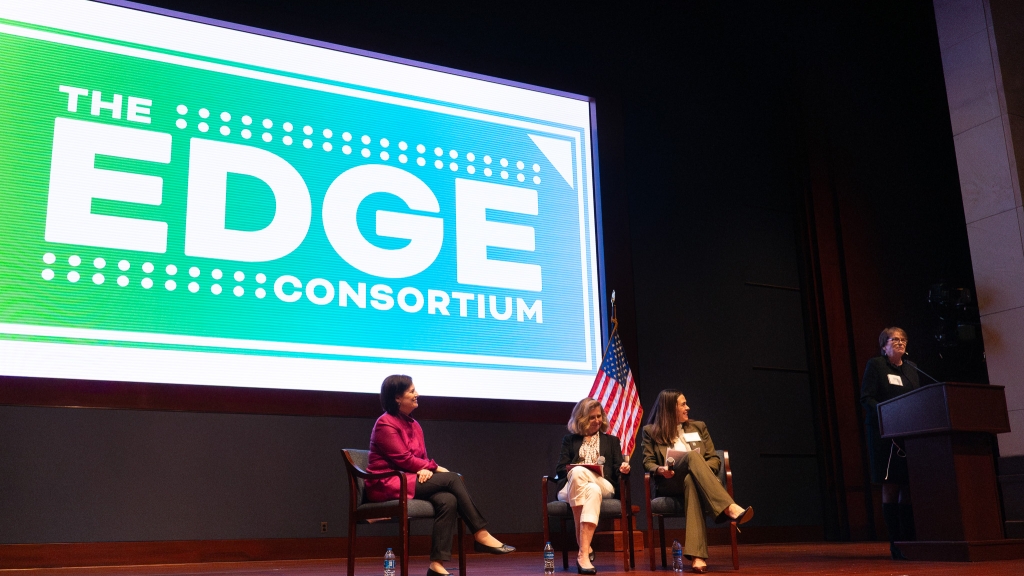The EDGE Consortium—a coalition of universities and engineering schools with women presidents and deans of engineering—convened a summit of educators, lawmakers, and industry leaders in Washington, D.C., in October to discuss what Dartmouth President Sian Leah Beilock has called the "once-in-a-lifetime opportunity" of the $52.7 billion federal CHIPS and Science Act.
Their goal is to bring more women and underrepresented minorities into careers in the semiconductor industry.
The Oct. 24 summit, Building a More Inclusive and Resilient Semiconductor Workforce, was led by President Beilock and Indiana University President Pamela Whitten.

From left, President Sian Leah Beilock and Thayer Dean Alexis Abramson talk with Brown Dean of Engineering Tejal Desai on Capitol Hill. (Photo by Julia Levine '23; Video produced by Downriver Media)
The event brought together a bipartisan coalition of educators, lawmakers, officials, and private sector leaders to the U.S. Capitol Visitor Center to seed cross-sector partnerships to take advantage of the CHIPS Act's unprecedented funding to transform the demographic makeup of the semiconductor industry specifically and of STEM fields more generally.
Increasing U.S. capacity to produce semiconductors, which are crucial for developing electronics, is a matter of national security that will require many more engineers than the U.S. currently produces, the consortium founders—including Beilock and Thayer School of Engineering Dean Alexis Abramson—argued in an open letter signed in April.
Beilock and the leaders of the other EDGE Consortium institutions—Brown University, Indiana University, Olin College of Engineering, University of California-Berkeley, University of Rochester, and the University of Washington—say the key to growing the industry is to increase opportunities for women and people of color in STEM. EDGE stands for Education for Diversification and Growth in Engineering.
Speaking at the summit, Sen. Jeanne Shaheen, D-N.H., said of the CHIPS Act, "It is a truly historic piece of legislation that gives us an incredible opportunity to invest in American innovation, to prioritize global competitiveness." Shaheen is chair of the Commerce, Justice, Science Appropriations Subcommittee.
"Women make up just one-tenth of the STEM workforce," said Rep. Pramila Jayapal, D-Wash., one of several lawmakers who addressed the summit. "The CHIPS and Science act is aiming to close these gaps."
"This is personal for Dartmouth," Beilock said, noting that Dartmouth was the first comprehensive university in the U.S. to achieve gender parity in its undergraduate engineering program.
"If we are going to diversify and expand, we have to look to women and people that are underrepresented," Beilock said. "We know that we have to do this with industry, we have to do it with government, and that it will take a wholesale effort."
Thayer School of Engineering Dean Alexis Abramson noted that while semiconductors now control a vast majority of everyday technologies, from smartphones to household appliances, electric vehicles, and banking systems, the semiconductor industry faces an acute talent shortage, projecting 67,000 unfilled jobs by 2030, with 26% of those jobs in engineering.
"This is not only about expanding the diversity of our workforce, but also our capacity for truly human-centered innovation," Abramson said. "We need engineers whose unique voices and diverse perspectives in the industry can drive cutting-edge technologies that improve and enhance the lives of people who use and interact with them."
Featured speakers at the EDGE event included Zoë Baird, senior counselor to the U.S. secretary of commerce for technology and economic growth; Sen. Maria Cantwell, D-Wash.; Fran Dillard, vice president and chief diversity and inclusion officer at Micron Technology; Sheryl Genco, vice president of the Advanced Technology Group at Ericsson; Sen. Maggie Hassan, D-N.H.; National Science Foundation Director Sethuraman Panchanathan; Association of American Universities President Barbara Snyder; and Sen. Todd Young, R-Ind., as well as other EDGE Consortium leaders.
While in D.C. for the EDGE summit, President Beilock also met with Sen. Kirsten Gillibrand '88, D-N.Y.
